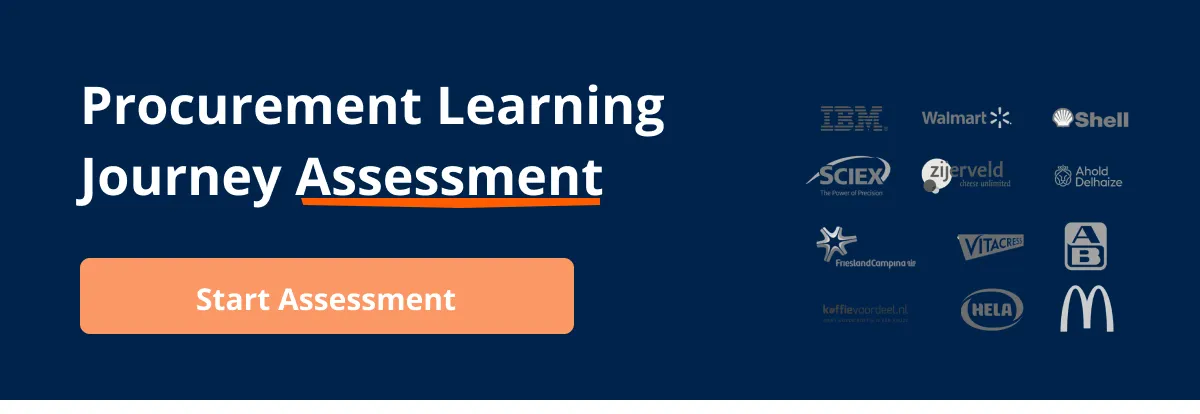ChatGPT & AI in
Procurement Course
Free Preview Lesson

Written by Marijn Overvest | Reviewed by Sjoed Goedhart | Fact Checked by Ruud Emonds | Our editorial policy
Identifying Suppliers — Embracing Sustainability
Key take-aways
- Choosing a sustainable supplier is a step-by-step process while considering ethical practices.
- Suppliers play an essential role in achieving sustainability.
- Engaging with sustainable suppliers leads to reduced environmental impacts and more.
Identifying suppliers is crucial as they supply all the needs of every business to continue its daily operations. However, how can you identify the best supplier that is fit for your business and sustainability standards?
This article will tackle what sustainable suppliers are. We will discuss how you can identify and engage with suppliers and the benefits of having a sustainable supplier.
After you read this article, you will know about identifying suppliers that can meet your sustainability standards. Additionally, it will allow you to avoid being at risk of engaging with suppliers that are non-compliant and susceptible to fraud.
What are Sustainable Suppliers?
Sustainable suppliers are people who provide materials and products that meet certain environmental and social standards of a business. Thus, they help achieve sustainability by reducing your purchasing impacts through your supply chain and procurement.
Suppliers play an essential role in sustainability. For you to achieve your sustainable goals, your suppliers must be fully engaged and understand their role in your sustainability journey.
Thus, it is important to choose your suppliers wisely. Selecting suppliers without evaluating them can pose a big risk for you to achieve sustainability. If they are selling unethically sourced materials, then you risk losing your credibility in striving for sustainability.
Identifying and Engaging With Suppliers
Working with suppliers on sustainable procurement takes a lot of effort when formulating strategy and planning to achieve the best results!
Finding suppliers who share your brand values and can assist you in achieving your environmental goals is crucial. You and your company must engage with suppliers to solve sustainability challenges that you may face
Engaging suppliers is intended to create a shared understanding of sustainability challenges, increase supplier ownership of their sustainability vision, strategy, and performance, and foster closer working relationships with suppliers that have the same interests.
Some companies developed an expanding range of procedures and tools for collaborating with their suppliers to achieve sustainability, and they have started to see the results of their efforts.
Because of their purchasing power, retailers have a great amount of influence over the commercial decisions made by their suppliers. Many organizations, also the ones that are not as powerful as large retailers, have adopted advanced and successful strategies for altering the behavior of their suppliers in recent years.
They go beyond spreading standards of behavior. What you can learn from them, is that they assist suppliers in creating sustainability programs that directly serve the goals of the businesses themselves.
We’ll see how you can also do this in your company step-by-step. The first step is making a list of suppliers in 6 simple ways:
- Research and identify local suppliers who offer sustainable products or services.
- Ask other businesses you know for recommendations on sustainable suppliers.
- Use the internet to look for sustainable suppliers.
- See if your current suppliers can offer any sustainable alternatives or products.
- Look for suppliers that commit to ethical and responsible practices.
- Look for suppliers that value transparency and have a reputation for quality.
The next step is to communicate your sustainability expectations to the suppliers. This means your current and your possible new or alternative suppliers. To do this, you can schedule a meeting with all your suppliers to explain to them the targets you wish to achieve through the sustainable procurement strategy.
Next, you must create a list of information that you want from the suppliers, to assess whether they can provide you with products that help you achieve your sustainability targets. You can also prepare a pre-qualification questionnaire. In this questionnaire, you can ask your suppliers about policies, processes, and performance.
These questionnaires can also be used to assess the economic, social, and environmental performance of existing suppliers. Prequalification helps to achieve the goal of knowing relevant information about the proficiency of suppliers.
Benefits of Engaging With Sustainable Suppliers
Engaging with sustainable suppliers is a must, especially if you want to achieve sustainability in your procurement process. Here are some of the benefits you can gain when engaging with sustainable suppliers:
1. Reduced environmental impacts
Sustainable suppliers are committed to reducing their environmental impact. Thus, they can help lower your carbon emissions and reduce waste.
2. Build a resilient supply chain
By engaging with sustainable suppliers, companies can build a more resilient and stable supply chain. This can lead to reduced risk, improved efficiency, and cost savings in the long run.
3. Brand image
Consumers are increasingly concerned about sustainability and environmental issues nowadays. By working with sustainable suppliers, businesses can improve their reputation and brand image which can lead to increased customer satisfaction and sales.
4. Social benefits
Sustainable suppliers prioritize fair labor practices, worker safety, and community engagement. Thus, they can help create positive social impacts in the communities where they operate.
Do you want to learn more about engaging with suppliers effectively? Then our course is the right fit for you. Our Sustainable Procurement Course will teach you techniques and strategies that will help you to engage with suppliers effectively. Enroll now!
Conclusion
The process of identifying and engaging with sustainable suppliers is a cornerstone in achieving long-term business sustainability.
The careful selection of suppliers aligning with environmental and social standards is vital for reducing the ecological footprint and ensuring ethical practices throughout the supply chain.
By actively involving suppliers in sustainability initiatives, businesses not only mitigate environmental impacts but also fortify their supply chains, leading to increased efficiency and cost savings.
Moreover, engagement with sustainable suppliers enhances brand image, meeting the growing consumer demand for eco-conscious products and contributing to heightened customer satisfaction and loyalty.
In a global landscape increasingly valuing responsible business conduct, proactive engagement with sustainable suppliers emerges not only as a strategic imperative but as a pathway to enduring success and positive contributions to the broader community and environment.
Frequentlyasked questions
What are sustainable suppliers?
Sustainable suppliers are people that provide materials and products that meet certain environmental and social standards of a business.
Why is it important to engage with the right suppliers?
It is important to engage with the right suppliers so your procurement process will not be susceptible to risks when achieving sustainability.
Why do you have to communicate your sustainability objectives with your suppliers?
It is important for them to know how to meet your sustainability standards and know your expectations from them when it comes to sustainability.
About the author
My name is Marijn Overvest, I’m the founder of Procurement Tactics. I have a deep passion for procurement, and I’ve upskilled over 200 procurement teams from all over the world. When I’m not working, I love running and cycling.


